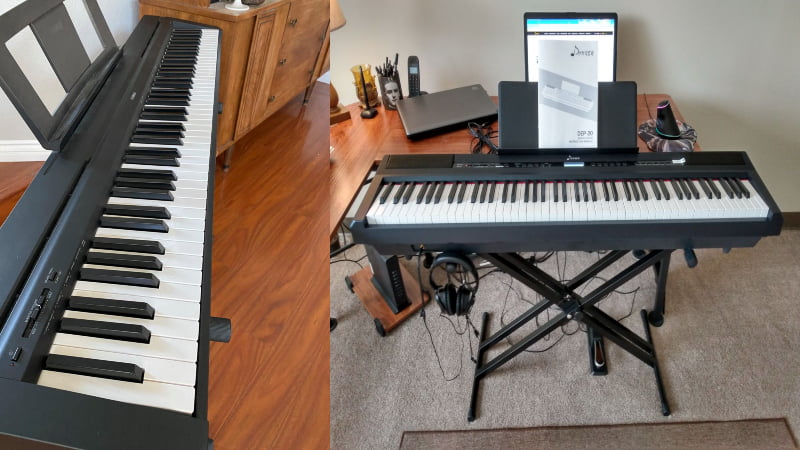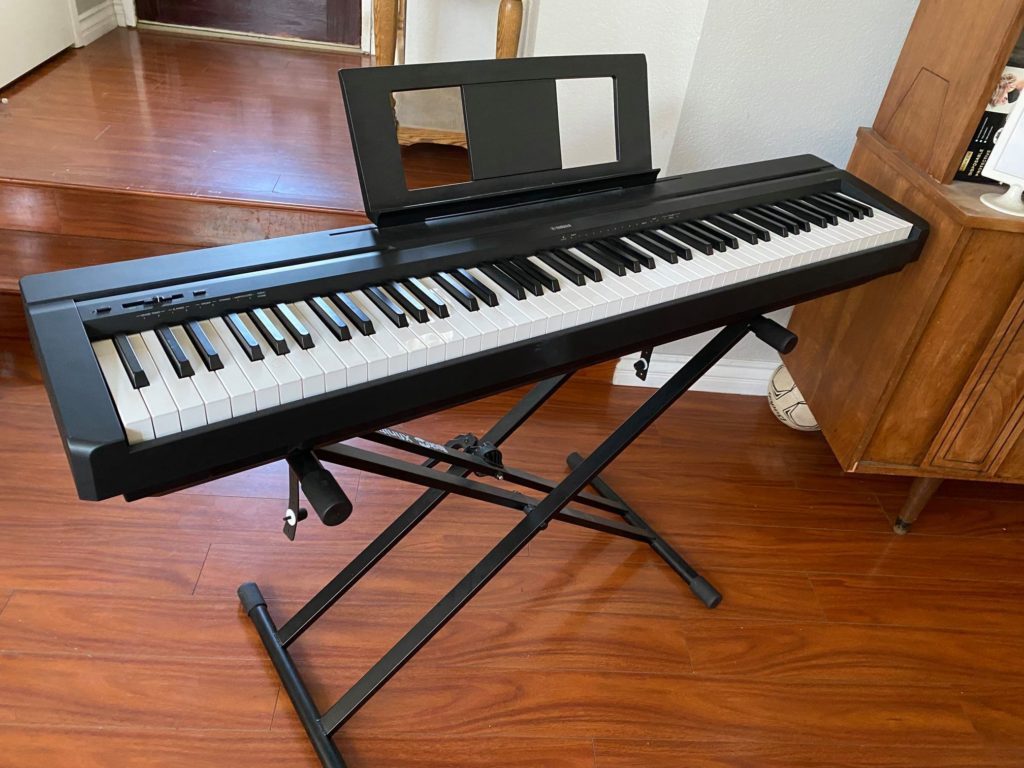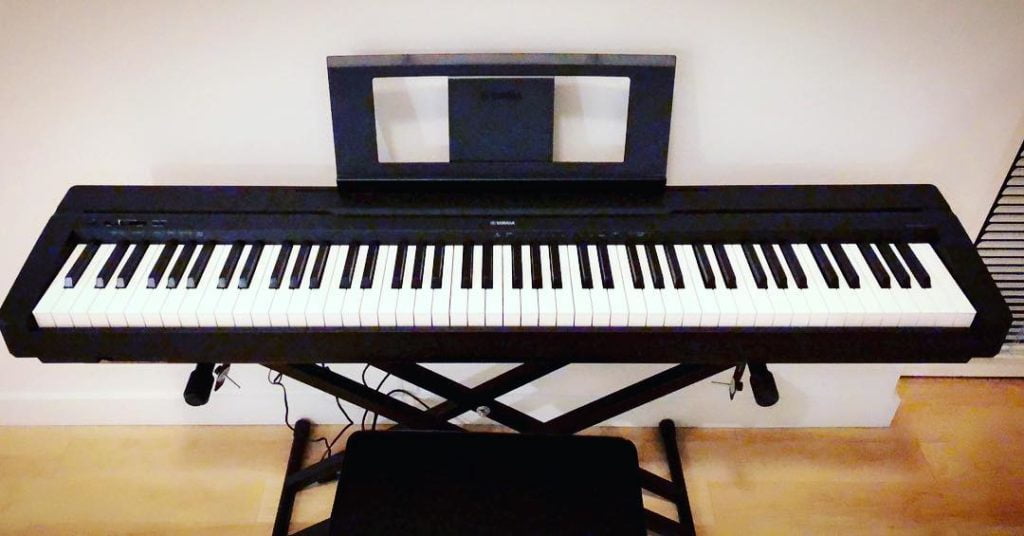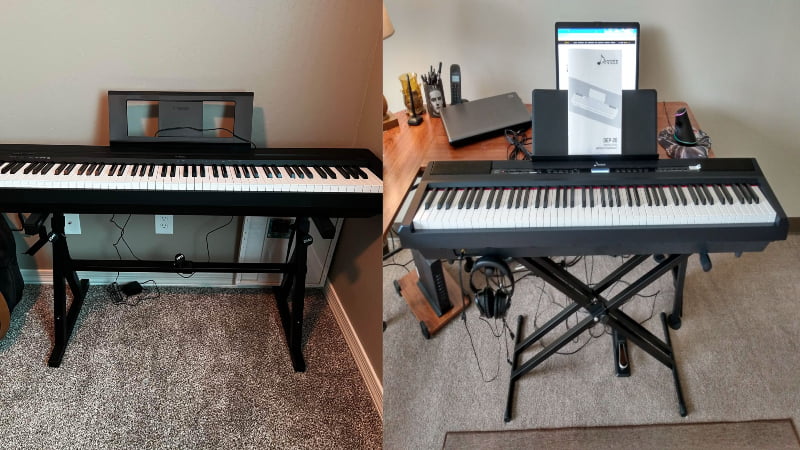When conducting this Yamaha P71 vs Donner DEP-20 comparison, I found that the choice was very easy. The Yamaha P71 sports great tones, playability, and extra features that are far beyond its price range. When trying this piano out, I found it to be the best in its price range, which is why it easily wins over the DEP-20.
With that said, the Donner DEP-20 still has some upside to it. It has a massive tone library, a surprisingly good sound system, and 128-note maximum polyphony. All of these are key features of a good piano. However, the tone quality and piano features of this instrument simply couldn’t compare to the Yamaha P71.
While the DEP-20 is slightly more affordable, the Yamaha P71 offers much more longevity and functionality for beginner and novice pianists, which is why it’s my favorite beginner piano on the market today.
Yamaha P71 vs Donner DEP-20: Comparison Chart




Last update on 2025-07-05 / Affiliate links / Images from Amazon Product Advertising API
Yamaha P71 vs Donner DEP-20: Differences
To figure out which option was the better choice, I decided to directly compare the features of the Yamaha P71 against the Donner DEP-20. And in doing that, I found that the Yamaha P71 wins by 3-1. While both pianos offer a semi-realistic feel to the keys, the tone quality of the Yamaha P71 was way better than the Donner DEP-20.
Feel
The winner: Tie

Both of these pianos have full 88-key keyboards with a variation of progressive hammer action. When testing these pianos out, I found that there was barely a difference when it comes to the feel and playability. Both offered a very realistic feel that you won’t find in this price range too often.
Key Texture
This is an area where the Donner DEP-20 has a very slight advantage, but only because it’s the more affordable option. If I were to have one complain about the Yamaha P71, it would be that the keys felt very plastic-like. The same rings true with the Donner DEP-20, as none of these pianos have a coating on the keys to simulate the feel of real wooden piano keys. However, since the Yamaha P71 is the more expensive option, I was expecting it to have a better key texture than the Donner DEP-20, which it sadly didn’t.
Hammer Action
In terms of hammer action, these two pianos are tied as well. While the Yamaha P71 features a progressive hammer action, it doesn’t use the Yamaha GHS system. This is one of the key differences between this Amazon exclusive and other Yamaha models. While I expected the Yamaha P71’s hammer action to be inferior to other Yamaha models, I was quite surprised that it held its own pretty well against the GHS system.
The Donner DEP-20 also features a surprisingly good hammer action system. On both of these pianos, you get a very realistic weight where the lower keys are heavier and get progressively lighter as you climb up the fingerboard.
Tone
The winner: Yamaha P71
In terms of tone, the Yamaha P71 was the clear winner without a doubt. I found that the tone of the Donner DEP-20 sounded very generic and synthetic at times, especially with the piano tones. On the other hand, the Yamaha P71 offers very realistic and crisp piano tones that are very consistent with other digital pianos from the band. And while the Donner DEP-20 had a much wider sound library, the quality of the voices was simply not up to par with the Yamaha P71.
Sound Library
The Donner DEP-20 comes with a massive sound library. With over 238 different sounds and voices, this is a very versatile piano. One of the reasons this model stands out from the pack is its wide sound library, as in this price range, you usually only get a handful of different tones.
A perfect example of this is the Yamaha P71. This instrument comes with 10 different voices. For beginners, this is quite a lot and offers room for experimentation, it’s very small compared to the Donner DEP-20. However, as they say, quality usually wins over quantity, and the Yamaha P71 undoubtedly has better quality sounds.
Tone Generation

The Donner DEP-20 uses a very generic tone generator. While the weighted keys make it feel like a premium piano, the tones are comparable to ones on much cheaper options. This is a slight let down, however, the voices are still very workable and definitely good enough for a beginner. With that said, it won’t take an expert to hear the flaws in the Donner DEP-20’s tone.
The Yamaha P71, on the other hand, features the AWM Sampling method. This tone generation technique takes very high quality samples from real Yamaha pianos. From there, a digital filter is added to make it sound more crisp. On top of that, Yamaha made sure to record the natural decay of the samples, for even more realistic sounds. This is the main reason I found the Yamaha P71 to be the better option. With much brighter, crisper, and more realistic tones, it significantly beat out the Donner DEP-20.
Piano Features
The winner: Yamaha P71
This is yet another area where I found the Donner DEP-20 to be lacking. When testing out the Donner DEP-20, I was let down by the very narrow selection of playing modes and other features. The Yamaha P71, while it doesn’t have the most features out there, still includes some of the most important ones for beginner and novice pianists.
Playing Modes
The Donner DEP-20 comes with dual mode. This playing mode blends two different voices so that when you press one key on the piano, you play two separate and distinct tones. This is a great feature for experimentation and allows for some really unique and memorable sounds. The Yamaha P71 also has this feature, but this is the only extra piano feature shared between the two.
Aside from dual mode, the Donner DEP-20 doesn’t have any other playing modes. On the flip side, the Yamaha P71 has duo mode, which can come in handy during piano lessons. This playing mode splits the keyboard into two mini pianos with the exact same tuning and timbre. That way, students and teachers can play along with each other and it will be like two musicians playing on separate pianos. On top of that, it also allows for easier technique demonstration without having to crossover to each other’s side.
App Integration & Connectivity
In terms of app integration and connectivity, the Yamaha P71 is the easy winner. While the Donner DEP-20 supports MIDI connectivity, there aren’t any partner apps you can use along with the piano. Instead, you’re going to have to find separate virtual instrument plugins compatible with the piano, which can be pretty hard for beginners.
While the P71 lacks MIDI connectivity, it does have great app integration. This piano comes with a bunch of different partner apps that you can use with the piano to learn new songs, make adjustments to the sound, and much more. This is a much more versatile piano that will last beginners much longer than the Donner DEP-20.
Effects

In terms of effects, the Donner DEP-20 actually has more presets than the Yamaha. The reason I still chose the Yamaha as the winner, however, is because of the quality of the effects. The Donner DEP-120 comes with reverb and chorus, which offers pianists unique control over their tone and is a great way to create unique sounds with the piano. With that said, these aren’t the best-quality effects out there and it definitely leaves a lot to be desired.
The Yamaha P71, on the other hand, only comes with reverb. However, it’s equipped with four different types of reverb that all have their own special charm and aesthetic. The reverb on the Yamaha P71 is more than enough for beginner pianists to add more depth to their tone, and is one of the best built-in reverb effects in this piano’s price range.
Yamaha P71 vs Donner DEP-20: The Similarities
The Yamaha P71 and the Donner DEP-20 are two pianos designed for beginner pianists. This is the first similarity between the two and it’s also the most glaring. While the P71 is slightly more expensive, they are still within the same price range, which is a great range for beginners. In this range you’ll find a bunch of great pianos on a budget, and the Yamaha P71 and Donner DEP-20 are both great examples of that.
They both feature 88-key keyboards with progressive hammer action, offer a realistic feel, and both come with decent speakers for practicing and jamming with other musicians. Between the two, the Yamaha P71 is the clear choice as you’ll be paying for some great features that are unique to the Yamaha P71.
The Donner DEP-20 is great if you’re on a tight budget. But if you have a few extra dollars to spare, you won’t regret investing it in the Yamaha P71 instead.
Quick Rundown of the Yamaha P71
- Acoustic Piano Feel - Touch-sensitive keys allow for true expression and dynamic performance. The weighted action replicates the acoustic piano experience
- Elevated Sound - Choose from 10 unique Voices, including the richness and resonance of a Yamaha grand piano, with full dynamic sound and deep bass
- Effortless Control - Simple one-button operation and streamlined functionality designed to keep you focused on your music
- Layered Sound - Dual Mode lets you blend two Voices, like piano and strings, creating a rich, layered sound for an inspiring new playing experience
- Included sustain pedal allows for subtle variations and greater expression in your performances
Last update on 2025-07-05 / Affiliate links / Images from Amazon Product Advertising API
Quick Rundown of the Donner DEP-20
- 🎹 【Full-Weighted 88 key keyboard】The digital electric piano is constructed by 88 full-sized hammer action keys with adjustable touch response. This 88-key weighted keyboard allows to adjust your desired playing style.
- 🎹 【238 Tones & 128 Polyphony】 The 88-key weighted keyboard loaded with 238 types of tone like Ukulele, drum, bass, etc. vividly presenting voices of different instruments, arousing your keen to learn music. The digital electric piano with 128-note max polyphony, players could distinguish tone clearly in Chorus & Reverb under various occasions.
- 🎹【Double Keyboard & Control Panel】This 88 key weighted keyboard provides dual-tone mode for combining two voices together, like piano and drum, inspiring to make a new creation. Panel includes sustain pedal, triangle pedal and audio inputs & outputs, perfectly used for music arrangement and an ensemble.
- 🎹 【Multi-Media Settings】This digital piano features with a backlit LCD screen for clearly showing chords names and notation and adjusting wanted tones, recording mode-MIDI, MP3 Player and two 25W amplifiers, bringing you richer and better experience of practice and performance.
- 🎹【Multi-Purpose 88 key keyboard】This streamlined 88-key piano is designed for rehearsing, learning and creating, practice or performance.
Last update on 2025-07-05 / Affiliate links / Images from Amazon Product Advertising API
Product Videos
Related Articles to Yamaha P71
- Alesis Virtue Vs Yamaha P71: Can The Alesis Console Piano Beat Out The Amazon Exclusive?
- Yamaha P71 vs P95: Which Is The Better Digital Piano?
- Yamaha P71 vs Korg B2 Comparison: Battle Of the Two Top Beginner Pianos On the Market
- Yamaha P71 vs Casio CDP-S150: Which Is the Best Beginner Piano On the Market?
- Yamaha P71 vs DGX-660: Can the Amazon Exclusive Beat Out the Premium Model?
- Yamaha P71 vs Casio PX-160 Comparison: Battle of the Two Best Digital Pianos on a Budget
- Yamaha P71 vs Alesis Recital: Why the Amazon Exclusive P71 Is the Best Option for Beginners
- Yamaha P71 vs Roland FP10 Review: A Tight-Knit Battle Where The FP10 Comes Out On Top
- Yamaha P71 vs Alesis Recital Pro: Which Digital Piano is the Best Option for Beginners?
- Yamaha P71 vs P125: Why the Yamaha P125 Is the Better Investment
- Yamaha P71 vs P45: Why the Amazon Exclusive P71 is the Better Digital Piano
Related Articles to Donner Dep 20
- Donner DEP-20 vs DDP-90: Which Donner Piano Wins Out?
- Yamaha P45 vs Donner DEP 20: Which Model Is the Better Option for Beginners?
- Donner DEP-20 vs DEP-45 Comparison: Is the Donner DEP-20 Worth The Higher Price Tag?
- Donner DDP-100 vs DEP-20 Comparison: Can the DEP-20 Beat Out the Donner Console Piano?
- Donner DEP-20 vs Alesis Recital Pro Comparison: Two Great Pianos Designed for Beginners
- Donner DEP-10 vs DEP-20: Which Is the Best Beginner Keyboard Under $500?
References:
- Donner DEP-20 Fully Weighted 88 Key Portable Digital Piano with Sustain Pedal: https://www.donnerdeal.com/products/donner-dep-20-beginner-digital-piano-88-key-full-size-weighted-keyboard-portable-electric-piano-with-sustain-pedal-power-supply
Lulacruza is an electronic folk duo operating at the junction of the hypermodern and the ancient. Our music weaves together hypnotic female singing, South American folk instruments and electronic processing, while channeling pulsating waves from the source of creation.
Lalucruza is also a community where you can connect with other music lovers to collaborate, exchange ideas and share knowledge. A platform for who wants to learns the basics of playing piano, guitar, drum masters’ technique, etc.. is the premise of our website.
